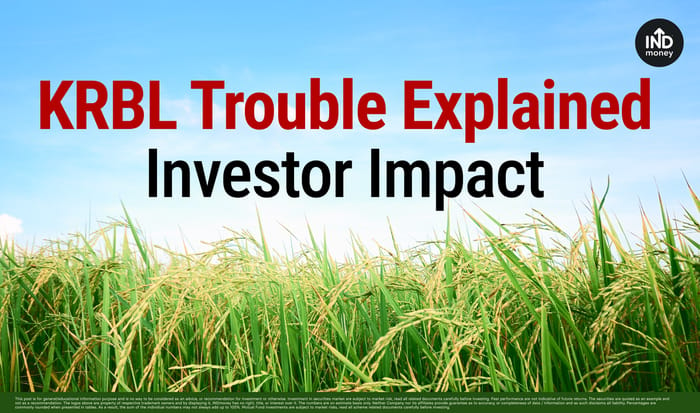
- What Happened?
- Why Does It Matter ? The Car Analogy
- Corporate Governance = Investor Safety Net
- Why the Market Reacted So Strongly
- Investor Key Takeaways
- Final Word
- Disclaimer
Shares of KRBL Limited, India’s leading basmati rice exporter, fell nearly 10% today after one of its Independent Directors, Anil Kumar Chaudhary, stepped down citing serious concerns about the way the company’s board functions. The resignation has rattled investor confidence and raised questions about corporate governance inside the company.
What Happened?
On September 13, 2025, KRBL informed the stock exchanges that Independent Director Anil Kumar Chaudhary had resigned. The company’s filing initially stated that there were “no other material reasons” behind his exit. However, the attached resignation letter revealed a very different picture.
In the letter, Chaudhary raised serious concerns about the company’s governance practices. He pointed out that board and committee meetings were not being recorded properly, and that important information was sometimes withheld from directors, making it difficult for them to make informed decisions.
He also highlighted instances such as the write-off of export receivables without adequate discussion, questionable handling of CSR funds, and arbitrary distribution of pay and increments to senior management. Adding to these concerns were major changes in the company’s object clause pushed through without thorough debate, and even undue interference by invitees in board proceedings.
Summing up his position, Chaudhary wrote that he found the board environment to be one where dissent was “suppressed or side-lined,” and continuing in such circumstances would go against his professional ethics and responsibilities as an independent director.
Why Does It Matter ? The Car Analogy
Think of a company like a car. The CEO and management are at the wheel, driving it forward. Independent directors are like the brakes and indicators, they don’t drive, but they ensure the ride is safe, balanced, and compliant with traffic rules.
When a brake fails or a warning light flashes, passengers (shareholders) get nervous. Even if the car is still moving, confidence in the journey takes a hit. That’s exactly what happened with KRBL.
Corporate Governance = Investor Safety Net
Corporate governance is the safety net that protects investors. Financial numbers may show how a company is performing today, but governance decides whether those numbers can be trusted tomorrow. A business might look strong on the surface, yet if decisions lack transparency or oversight, its growth becomes fragile.
That is why an independent director resigning over ethical concerns matters so much. It is like a warning that the brakes on a fast-moving car are failing, the engine may still run, but the risk of a crash has suddenly risen. Strong governance may not always be visible, but when trouble comes, it is what shields shareholders from lasting damage.
Why the Market Reacted So Strongly
Independent directors are expected to act as a check on management and protect the interests of all shareholders. When one resigns citing governance lapses, it sends a red flag to investors:
- Are financial decisions being taken transparently?
- Are shareholder interests truly being protected?
- Can investors trust the numbers being reported?
The answers to these questions directly affect how the market values the company. That explains why KRBL’s shares dropped sharply despite no immediate changes in its business fundamentals.
Investor Key Takeaways
This episode highlights some important lessons for retail investors:
- Governance matters as much as profits: Strong quarterly results are important, but weak governance can undo shareholder value very quickly.
- Always read beyond the headline: Regulatory filings often carry attachments like resignation letters or auditor notes that reveal the real story.
- Resignations are signals: A single exit may not always mean trouble, but when reasons involve ethics and transparency, it’s a warning sign worth noting.
- Trust is part of valuation: Companies with clean governance often trade at higher valuations because investors believe their profits are sustainable.
Final Word
In short, KRBL’s 10% share fall wasn’t about business performance alone, it was about trust. The resignation of an independent director over governance lapses signalled deeper issues that rattled investors. For retail shareholders, the lesson is clear: profits may drive prices in the short term, but strong governance is what sustains value in the long run.
Disclaimer
Investments in the securities market are subject to market risks, read all the related documents carefully before investing. The securities are quoted as an example and not as a recommendation. This is nowhere to be considered as an advice, recommendation or solicitation of offer to buy or sell or subscribe for securities. INDStocks SIP / Mini Save is a SIP feature that enables Customer(s) to save a fixed amount on a daily basis to invest in Indian Stock. INDstocks Private Limited (formerly known as INDmoney Private Limited) 616, Level 6, Suncity Success Tower, Sector 65, Gurugram, 122005, SEBI Stock Broking Registration No: INZ000305337, Trading and Clearing Member of NSE (90267, M70042) and BSE, BSE StarMF (6779), SEBI Depository Participant Reg. No. IN-DP-690-2022, Depository Participant ID: CDSL 12095500, Research Analyst Registration No. INH000018948 BSE RA Enlistment No. 6428. Refer https://indstocks.com/pricing?type=indian-stocks; https://www.indstocks.com/page/indian-stocks-sip-terms-and-condition for further details.